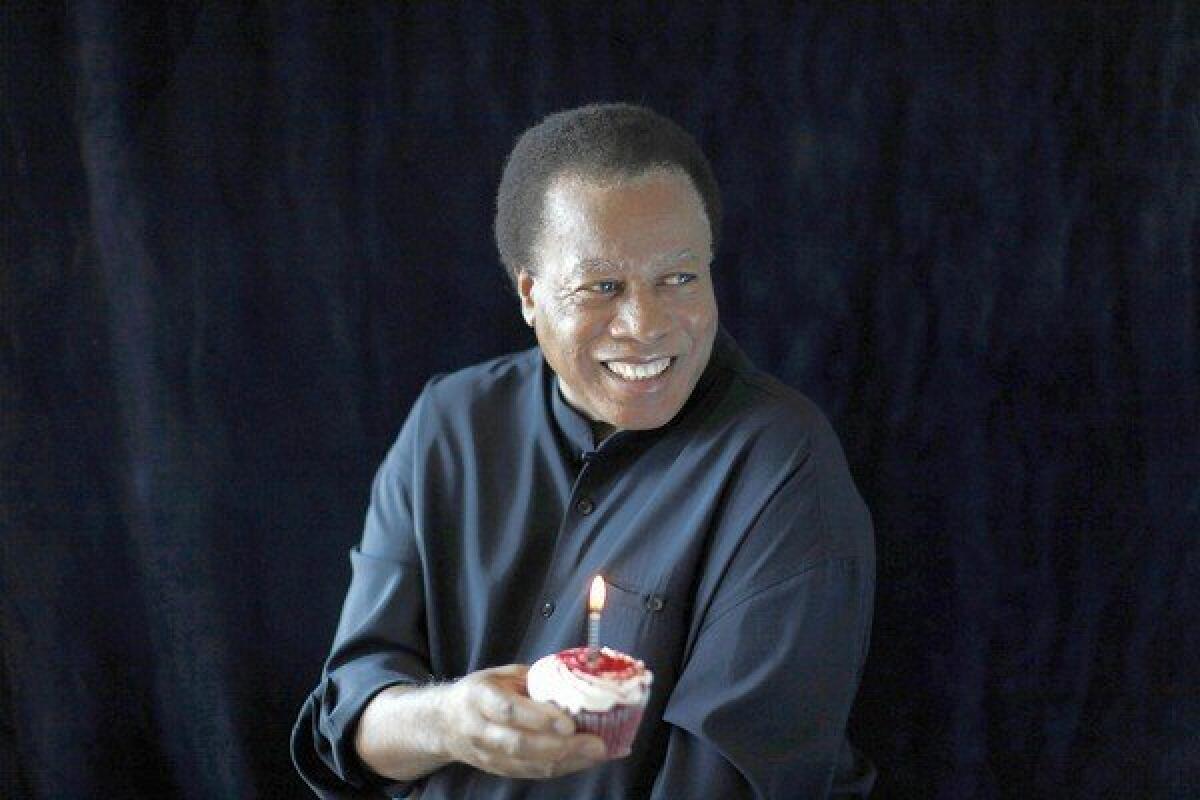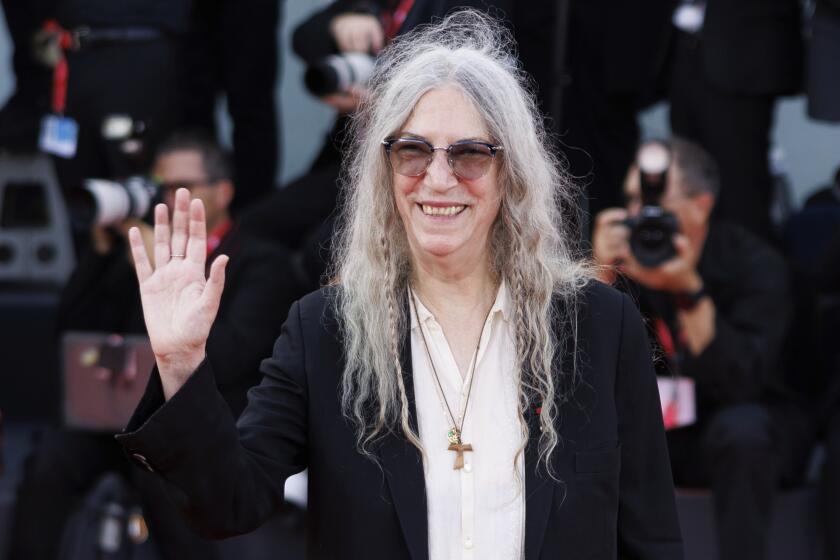Jazz legend Wayne Shorter marks his 80th but is never ‘finished’

- Share via
This post has been updated. See below for details.
There’s something oddly appropriate about seeing Wayne Shorter wearing a Superman symbol.
True, it’s only a dog tag-shaped memento from the Christopher Reeve Foundation hanging from his neck, but the heroic detail suits the saxophonist when considering the impact of his career. As a composer and soloist, the 80-year-old artist has shaped jazz both on his own recordings and recordings with Art Blakey, Miles Davis and the landmark jazz-rock fusion group Weather Report.
FOR THE RECORD:
Wayne Shorter: In the Aug. 25 Arts & Books section, an article about Jazz saxophonist and composer Wayne Shorter identified musician Wallace Roney as a saxophonist. Roney plays the trumpet.
Seated in front of a window at his hillside Los Angeles home overlooking West Hollywood, Century City and, on a clear day, the Pacific, Shorter smiles when asked about the bright red-and-gold logo. He flips it over to show the front, which identifies the foundation and a slogan that seems just as fitting: “Go forward.”
TIMELINE: Summer’s must see concerts
“I like to turn it around: ‘No, this is a two-way street,’” he explains.
It’s the kind of oblique yet curiously apt explanation that comes up often while trying to put Shorter’s idiosyncratic musical path into words. Because as much as Shorter’s impact on the sound of jazz and improvised music lends itself to superhuman comparisons, it’s not as if the composer has spent 2013 retired in some hillside fortress of solitude.
In fact, it’s quite the opposite. During what’s amounted to a yearlong celebration of Shorter’s 80th birthday (which culminates Wednesday in an all-star concert at the Hollywood Bowl organized by longtime friend and collaborator Herbie Hancock), Shorter appears determined to look ahead.
In addition to the winter premiere of a sprawling composition, “Gaia,” at Disney Hall, written for rising star Esperanza Spalding, and a recent live collaboration with the Orpheus Chamber Orchestra at Carnegie Hall, Shorter also released “Without a Net,” a relentlessly searching live album with his current quartet that’s his first album for Blue Note in more than 43 years. It also happens to be one of the most acclaimed jazz records of the year.
“No one knows what’s going to happen each night,” he says of his ever-exploring band, which features drummer Brian Blade, pianist Danilo Perez and bassist John Patitucci (the group will also perform Wednesday). “I always say, we don’t really rehearse,” Shorter adds. “How do you rehearse the unknown?”
The album features newly expanded takes on older Shorter compositions such as “Orbits,” which has become something of a standard since its inception with Miles Davis’ quintet in 1967, and “Plaza Real,” which stems from Shorter’s Weather Report days in the ‘80s. These set up the debut of “Pegasus,” which marks a meeting point between orchestral structure and free-flowing improvisation over 23 minutes. Nodding backward while restlessly surging forward, the record balances oppositional forces.
“I like contradictions,” Shorter says with a smile. “When they rub and spark, they make a flame that illuminates.”
Spalding regularly covers Shorter’s music (including the track “Endangered Species” on her 2012 album “Radio Music Society”), but when asked to describe what draws her to his music, she pauses to think about it.
“I guess it’s his spirit and creativity that shines through his mastery is what really moves us, what draws us to the music,” she says. “Simply said, it’s his spirit that we feel and hear.”
She excitedly recounts what she calls a “scary” experience of first performing with Shorter and Hancock, which in her mind became something of an internal struggle. “It really just feels like there’s a dialogue going on like, ‘This is so wonderful and fun, oh, my God, I can’t believe this, listen to what’s happening’ and then the other part of me is like ‘Don’t try and be hip, Esperanza, like chill out,” she says. “Because … you know, these are your superheroes.” (There’s that word again.)
“He might be … what writing should be about,” says trumpeter David Weiss, a frequent explorer of Shorter’s compositions, most recently with the new live album, “Endangered Species: The Music of Wayne Shorter,” which expands five Shorter compositions into a large ensemble that features pianist Geri Allen and saxophonist Ravi Coltrane. “Just writing a nice melody is not enough, writing some interesting chord changes is not enough,” Weiss adds.
PHOTOS: ‘Opening Night at the Hollywood Bowl’
Weiss also recently started work with trumpeter Wallace Roney on performing long-form large ensemble pieces Shorter wrote for Miles Davis in the late ‘60s but never recorded. Weiss explains, “Wayne’s music just has the possibilities.”
Shorter’s attraction to the unknown and its opportunities has also made him a dedicated fan of science fiction and fantasy. He recounts a fascination with Captain Marvel — later known as Shazam — that began when he was a child, and after recommending books by Stephen King, Alan Dean Foster and Whitley Strieber, Shorter delights in sharing his collection of superhero figures lined up in his office. They share the space with a wall-size shelf of DVDs (sample title: “Donnie Darko”), laser discs, an electric keyboard and a row of Grammys.
When asked what draws him to the fantastic side of storytelling, he pauses. “It’s not what it seems. It’s not what you’ve been taught,” he says. “Whatever it is, you have to — yourself — investigate what it is.”
This importance to finding your own voice is a recurring theme for Shorter. In a teaching session at the Thelonious Monk Institute at UCLA last spring, Shorter and Hancock led a seven-piece band of students in a class that was less about music and more about self-expression. After one exercise, Shorter singled out the trumpeter for what he heard as a step toward his identity. “The instrument doesn’t play you anymore, you play the instrument,” Shorter said.
“When Wayne plays,” Hancock added, “I don’t hear a saxophone. I hear Wayne.”
Back in West Hollywood, Shorter expanded the idea while remembering conversations with young musicians who ask for advice, which also directs toward himself.
“My response is, ‘Try to write and play what you wish for,’” Shorter says. “Take all the music lessons … all your Grammys, all your awards — your credentials — put them aside and think about what are you going to say after you say, ‘Once upon a time.’”
As for what comes next for Shorter, he and his band recently went into the studio with the Orpheus Chamber Orchestra to record an album, which he hopes to release after mixing. He also hopes to keep refining “Gaia,” the amorphous, shape-shifting composition with Spalding and the L.A. Philharmonic. “I don’t like that word ‘finished,’” he says. “It’s up for review.”
“You can close the book on something, but I look both ways,” he says. “Your present is a culmination of everything you’ve done in the past. It’s your report card.”
While the music world has understandably greeted the approach of his 80th birthday with an array of tributes to an influential career (“It’s because [I’m] getting old,” he says), Shorter still strives to look beyond what everyone else is doing. “To me, the celebration is like a door that’s hardly ever open,” he says. “They stop at celebrating and never open the door.”
Shorter leans forward in his chair and pantomimes peering into a tight space. “I want to see what’s in here,” he says.
Update: Aug. 25, 5:40 p.m.: An earlier version of this post mistakenly identified Wallace Roney as a saxophonist. He plays the trumpet.
More to Read
The biggest entertainment stories
Get our big stories about Hollywood, film, television, music, arts, culture and more right in your inbox as soon as they publish.
You may occasionally receive promotional content from the Los Angeles Times.











